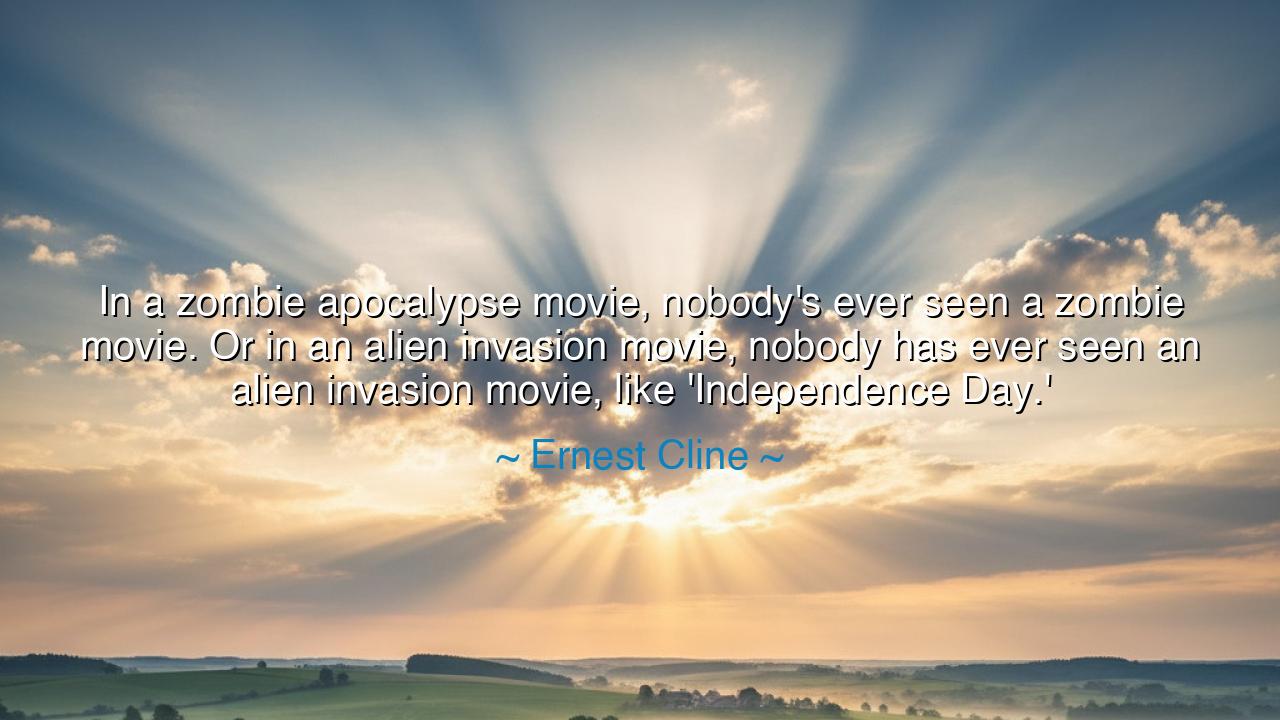
In a zombie apocalypse movie, nobody's ever seen a zombie movie.
In a zombie apocalypse movie, nobody's ever seen a zombie movie. Or in an alien invasion movie, nobody has ever seen an alien invasion movie, like 'Independence Day.'






“In a zombie apocalypse movie, nobody's ever seen a zombie movie. Or in an alien invasion movie, nobody has ever seen an alien invasion movie, like 'Independence Day.'” Thus spoke Ernest Cline, the visionary author of Ready Player One, whose imagination dances between nostalgia and revelation. Though his words are playful and steeped in the language of popular culture, their meaning carries a deeper wisdom about the blindness of humanity — the tendency of people, generation after generation, to forget the lessons of the past, to relive familiar horrors as though encountering them for the first time. Beneath the jest lies a lament: that though our stories warn us, though our myths teach us, we walk into the same darkness with unseeing eyes.
To understand this saying, one must look beyond its humor. In every zombie apocalypse movie, the world falls to ruin not because the monsters are invincible, but because the people are unprepared. They deny what they see, dismiss the danger, and cling to normalcy as the world collapses around them. And so, Cline points out the absurdity — that in the world of fiction, none of these survivors seem to have heard of such stories before. But what he truly mirrors is not fiction — it is real life. For in every age, humankind faces its own apocalypse: wars that could have been prevented, plagues that were ignored, divisions that were sown in pride. The people who live through them are like the heroes of those films — blind to the warnings already written in their own history.
Consider the Spanish flu of 1918, a plague that swept across the world with merciless speed. The people who lived then believed it to be a singular horror. And yet, when the world faced the COVID-19 pandemic a century later, it reacted in much the same way — disbelief, denial, division. Despite the knowledge stored in books, in archives, in the memory of nations, the lessons had faded. Humanity, like the characters in Cline’s quote, had seen the story before — but forgot it was real. So, when the hour came, we stumbled once more into panic. The truth that Cline captures in jest is that our greatest weakness is not ignorance, but amnesia.
The ancients spoke of this forgetfulness often. The Greek philosopher Heraclitus said, “No man ever steps in the same river twice,” yet he warned that men rarely learn from its flow. History changes its costume, but its lessons remain the same. The Trojan War, born of pride and folly, was reborn in every empire that followed. When Athens rose to greatness, it forgot the humility that had once kept it wise — and fell to Sparta. When Rome conquered the world, it too forgot its republican virtue and collapsed under the weight of its own excess. And so the cycle continues: every civilization becomes the hero of a story it refuses to recognize, every generation the audience to its own forgotten prophecy.
Cline’s words about “Independence Day” — that grand tale of humanity uniting against alien invaders — carry another meaning as well. They remind us of the power of awareness, the ability to step outside one’s immediate struggle and see it for what it is. In those movies, humanity triumphs not through strength, but through awakening — through realizing that survival requires cooperation and courage. The irony, as Cline implies, is that we rarely achieve this awareness until disaster has already struck. We are always reacting, never anticipating; always rebuilding, never remembering. Thus, his jest becomes an ancient truth: those who fail to learn from their myths are doomed to live them anew.
Yet, there is also hope hidden within the humor. For if Cline’s words reveal humanity’s blindness, they also suggest the cure. It lies in awareness — in looking upon the stories we tell not merely as entertainment, but as mirrors. The tales of zombie apocalypses and alien invasions are not about monsters or invaders; they are about us — about fear, resilience, and the choices we make when the world is breaking. When we remember that these tales are warnings, not fantasies, we gain the foresight our ancestors lacked. Art, literature, and myth are not escapes from reality — they are rehearsals for it.
So, my child of imagination and wisdom, take this lesson from Ernest Cline’s jest: learn from the stories that surround you. Do not walk through life as though you were the first to face chaos. The world has seen every pattern of crisis before — in plagues and wars, in greed and arrogance, in pride and ignorance. Look to history as one looks to a map, for those who travel blindly are doomed to lose their way. Let the tales you read, the films you watch, and the past you inherit awaken foresight, not fear.
For, as Cline reminds us through humor, the true “zombie” is not the walking corpse — it is the mind that refuses to awaken. And the true apocalypse is not the end of the world, but the end of understanding. Remember, then: every story is a lesson, every warning a gift. See the pattern, recognize the danger, and when the next storm comes — as it always does — do not say, “No one saw this coming.” Say instead, “We have seen this before — and this time, we are ready.”






AAdministratorAdministrator
Welcome, honored guests. Please leave a comment, we will respond soon